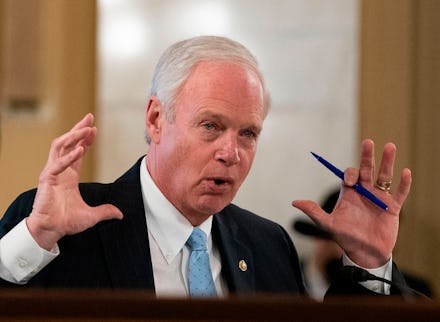Senate Republicans are going to absurd lengths to block your stimulus check

We're closing in on a full year since the CARES Act of 2020 sent some desperately needed pandemic payments to most people's bank accounts, and more than two months since the laughably insufficient $600 follow-up from the Trump administration. Now, with another vital COVID relief bill finally on the cusp of belatedly offering millions of Americans some pathetically minimal sense of financial stability, Senate Republicans seem committed to going out of their way to make the final passage of the Biden administration's $1.9 trillion package as difficult and painful as possible.
Leading (or, more accurately, "slowing") the charge is Wisconsin sedition enthusiast Sen. Ron Johnson, who vowed on Wednesday to force the Senate clerk to read the full stimulus bill — which runs upwards of six hundred pages — aloud before any voting can take place. His stalling tactic, expected to waste hours upon hours of precious time that could be spent actually passing laws, is simply the opening salvo in what could become a marathon stretch of debate and voting on attached amendments to the bill — all designed to delay the plan's final passage and make the process as painful for Democrats as possible.
What's more, should the GOP's strategies actually succeed in derailing the relief bill, Republicans wouldn't simply be punishing Democrats in Congress; with enhanced unemployment benefits set to end on March 14, any delays to this bill could very feasibly deny crucial funds to an estimated 11 million people who rely on the boosted benefits to survive during the coronavirus pandemic.
Incredibly, Johnson's effort comes as the Biden stimulus package enjoys soaring bipartisan popularity, with 76 percent of voters supporting the bill, according to a recent Morning Consult/Politico poll.
Given the staggering enthusiasm, it's perhaps surprising (or not...) that Democrats have also managed to bungle the stimulus roll out, with a last minute plan to limit recipients based largely upon their 2019, pre-pandemic reported income. All told, the change could see as many as 17 million people suddenly finding themselves ineligible for the $2,000-turned-$1,400 checks they were promised.
Republican obfuscation and Democratic tinkering aside, House Speaker Nancy Pelosi remained optimistic that her chamber would be able to pass the final Senate draft of the bill. On Wednesday, she said that, although Democrats want to look into potential changes before committing one way or another, "so far, so good."